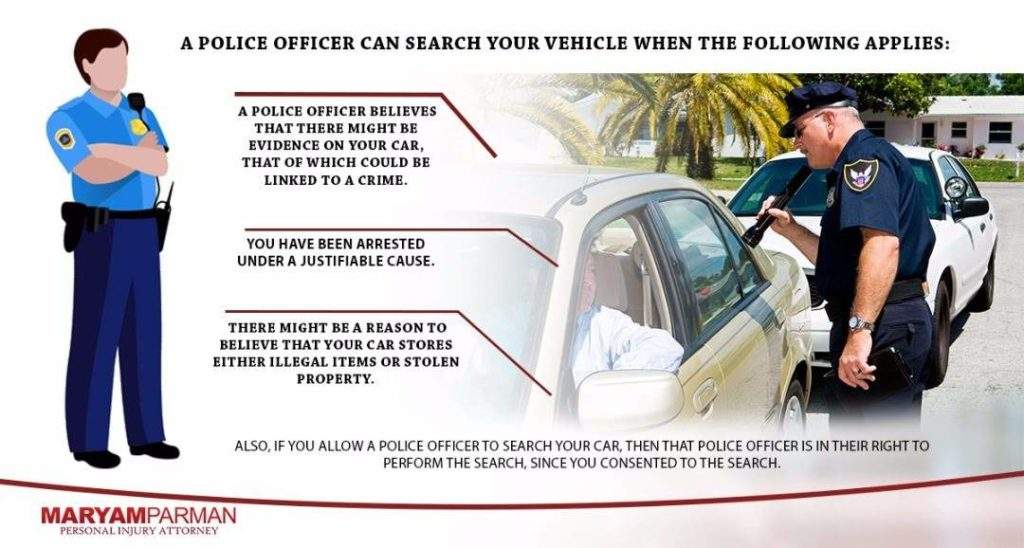Being pulled over can be, at best, a nuisance and, at worst, a frightening experience. In many cases, a police officer can ask you to allow them to perform a search on your vehicle. You might think that the police officer will first have to have a warrant in order to be able to search your vehicle. However, that is not the case.
In the United States, the law permits a police officer to perform search and seizure of a vehicle in specific cases. It does not, however, permit a police officer to perform a search without first having some justification. It’s important to understand the many variables of the search and seizure process as this is key to knowing whether or not a police officer has searched your car without your consent and beyond of what law allows them to.
Does a police officer need a warrant to perform a search on your car?
There is a common misconception that a police officer needs a warrant in order to perform a search on a vehicle. That misconception comes from the belief that what applies to private property, such as a household, also applies to a vehicle. This belief is simply false and the Supreme Court has gone on record to say that police are allowed to search a vehicle so long that search is based on reasonable cause, such as the vehicle being involved in a crime. That authority has been granted to them under the Fourth Amendment.
There is, however, no clear-cut definition of what is considered reasonable. But, a summary can be made that group specific situations in which a police officer is allowed to search your vehicle with the proper justification.
As such, a police officer can search your vehicle when the following applies:
- A police officer believes that there might be evidence on your car, that of which could be linked to a crime.
- You have been arrested under a justifiable cause.
- There might be a reason to believe that your car stores either illegal items or stolen property.
Also, if you allow a police officer to search your car, then that police officer is in their rights to perform the search, since you consented to the search.
Is a police officer allowed to perform a search for my car on a routine pullover?
If a person has been pulled over under a minor traffic violation, then said police officer is not allowed to perform a search of the car. The police officer is only allowed to perform a search of the car if there is cause during a routine pullover, however, as stated before, a police officer can also perform a search and seizure of a vehicle if the person is arrested. A police officer can be also allowed to perform a search of the vehicle if said vehicle is confiscated. In fact, searching a car when it has been confiscated has a specific name: inventory search.
The concept of “Plain in view” and how it may apply to search and seizures of a vehicle
What is known as the “Plain View” standard states that a car can be searched and anything within arm’s reach can also be searched. These standards suggest that a police officer can basically search one’s belongings inside a car. Anything that can be considered to be in plain view can be seized by the authorities. This concept applies to anything that can be perceived under the person’s control. This is because the item that a police officer might be looking for could be stored inside an object in plain view.
What are the rights of the passengers when a police officer asks to perform a search?
If a passenger is inside a vehicle when said vehicle is pulled over, then the officer is allowed to extend their privileges to include the search of both parties. A search on the passenger can be conducted if there is the belief that the driver has been stopped on a legally defensible basis.
Can a search be performed on a car if said car is relocated to another location?
If the party is involved in a crime which is currently in progress, then the vehicle may be searched if said vehicle is relocated. People who are involved in a crime such as a robbery incident may be pulled over and have their car searched and seized. Their vehicle will be relocated to a safe location and will be subject to a search. This is so the police officer will be able to perform an extensive search on the vehicle.
What privileges does a police officer have if the person stopped has any involvement in a crime currently in progress?
If a person is suspected to be armed and dangerous, then a police officer can stop the driver and any passengers inside by any means necessary. The vehicle can be searched if an arrest was made instead of a citation.
Your car can be searched by the authorities but only in certain situations. If the stop was unlawful, the search of a vehicle is considered unlawful. If there is reasonable cause to search the vehicle, then the car can be searched by the authorities. If anything is in “plain view” or under the driver’s control, the police can search it if it is believed that the object of interest is being concealed. The vehicle can be searched if confiscated or transported to another location if an arrest is made.

